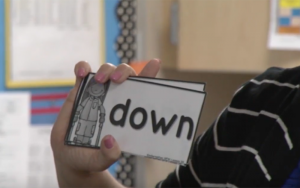- Slug: Free preschool. About 560 words.
- Video story, photo available (thumbnail and caption below)
By ALEXA STUECKRATH
Cronkite News
TEMPE – Children living in poverty will be able to attend a free preschool program to jump start their academic potential and narrow the learning gap between poor and more well-off students.
“In our community we have a lot of students that are coming into kindergarten that are not meeting kindergarten readiness benchmarks,” Tempe council member David Schapira said. “Two-thirds are not meeting benchmarks in our city.”
Thew Elementary School in Tempe was chosen for a new, free preschool program the city is rolling out in August. More than 80 percent of its students qualify for free and reduced lunch.
“There are so few high quality preschool options in this area,” Schapira said. “And the fact that the poverty rate is so high among three and four year olds, this is a perfect location for us to open a preschool.”
Money has been allocated to fund the program in the proposed budget, which will be approved by June 30.
“These are not taxpayer dollars. This is money paid by developers to the city of Tempe for development projects in the city,” Schapira said.
Charting path to academic success before kindergarten
Research has shown that how successful a child is in school affects the path they will take for the rest of their lives. Attending preschool better prepares a child for future academic success, said Billie Enz, an early childhood professor.
New research published by the American Educational Research Association shows the gap between children who attend preschool and those don’t attend is narrowing, but a divide still exists.
“Children living in poverty hear about 30 million fewer words when they enter kindergarten than children who are in upper and middle socioeconomic status,” Enz said.
Children in low-income families have only one book at home, or 25 hours of reading by the time they enter kindergarten, compared to 54 books that lead to 1,500 hours of reading time for children whose families are more well off, according to the research-association study.
“If children don’t come to school being able to listen, being able to follow directions, being able to pay focused attention they are already almost a year behind without any fault of their own,” Enz said.
She said preschool also teaches valuable social skills from being around other children, such as how to share, listen, take turns and follow directions.
“All of those things don’t happen when you just have you and your sibling at home,” Enz said.
Kindergarten teacher says learning curve too steep
Kindergarten teacher Tracey Valenzuela sees a wide divide between students who attend preschool and those that don’t.
“Kids that go to preschool are coming into kindergarten ready to learn…they know how to sit for short periods of time, they know how to get along with each other,” said Valenzuela, who teaches at Thew.
Valenzuela said it’s common for children who didn’t attend preschool to start kindergarten not knowing how to say their own name, let alone spell it. They may know only two letters, compared to other students who know most or all of the 26-letter alphabet. And, as they start learning to spell, many letters will be written backwards or upside down.
“Kids start at ground zero and to have them almost two or three grade levels higher by the end of the year and to make that kind of growth is difficult,” Valenzuela said.
^__=
Students who don’t attend preschool often
fall behind in kindergarten, educators say.
Photo by Alexa Stueckrath/Cronkite News)
